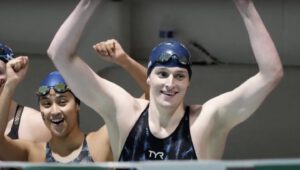Female jiu-jitsu competitors refused to face biological men nearly twice their weight, leading to competition policy change
In a recent Brazilian jiu-jitsu tournament, female competitors refused to compete against biological males who identified as transgender women, leading the governing body to create a biological…

In a recent Brazilian jiu-jitsu tournament, female competitors refused to compete against biological males who identified as transgender women, leading the governing body to create a biological female-only division.
But the North American Grappling Association (NAGA) was dragging its feet for weeks after fielding complaints before finally making the change.
In September, female martial artist Taelor Moore faced transgender fighter Alice McPike, who was formerly known as James.
“I weighed in at 135…and she was over 200!” Moore posted on Instagram.
Despite Moore winning the match, her coach, Smitty Wit, took issue with the matchup.
“I have a student who went against a trans athlete in an open-weight division for jiu-jitsu grappling, a combat sport,” Wit wrote on Instagram. “I’m sure a lot of people hearing this are thinking that my student lost. No, she won. But I have a really big issue at hand, this is a very serious topic.
“In jiu-jitsu, we don’t drug test. You can take steroids. Everyone knows this. It is what it is. When you step on these mats, you waive your rights to your life…. And I had to gaslight my student, just to keep her morale up.”
During the same tournament, McPike managed to win a silver medal in the women’s Absolute No-GI Indeterminate category after defeating a female athlete, according to Low Kick MMA.
NAGA, in response to backlash over unfairness, claimed its policy gives female competitors the choice to compete against transgender athletes.
“NAGA does not require biological women to compete against transgender women,” NAGA stated, according to Reduxx. “Instead, we give the choice to the biological women, and if they decline, they compete in a division only with other biological women.”
However, Ansleigh Wilk and Jayden Alexander, two female competitors, stated that they were not given this choice when they faced biological males in previous matches.
“I hadn’t been notified,” Wilk said, according to the Gateway Pundit. “The only thing that brought it to my attention was my teammates. They kept asking me ‘are you fighting a man’ and I was honestly too focused on coaching the rest of the crew to really pay attention to my opponent.”
“I realized very quickly I couldn’t muscle them like most girls,” she continued. “Well obviously, because it wasn’t a girl! Then not long after, I had to do a second match of which Cordelia [Gregory] threw a tantrum saying he ‘didn’t tap out.’ I was sincerely scared he was going to punch me when I stuck my hand out to shake his.”
Wilk and Alexander both competed against Gregory, a biological male, and expressed similar feelings of shock and disbelief.
“I honestly never thought this would actually happen in a contact sport, especially not MY contact sport,” Alexander told Reduxx. “When I saw him, I was so shocked I didn’t know how to respond.
“The fact of the matter is that he had a man’s strength. I train with men and women and the difference is massive. After my match with Cordelia, I sat mat-side and cried as my teammates massaged out my cramping forearms.”
Wilk and Alexander both planned to compete in a tournament on Oct. 21, but dropped out when they learned biological males were competing in the women’s division.
“For a man to be able to come in and sign up in the women’s bracket and discourage us from even being able to compete at all is absolutely heartbreaking and honestly scary,” Alexander said.
As a result of many female competitors withdrawing from the tournament, the women’s division ended up with more male participants than female, making the problem obvious.
Corissa Griffith, a biological male, took home four gold medals during the tournament.
Danielle Lenane, one of the only female competitors who competed, had to fight both Gregory and Griffith. After the fights Lenane requested both fights be removed from her records, according to Reduxx.
In the Women’s No-Gi fight for the 160-169lb weight class, Griffith and Gregory were the only two participants.
As news of the tournament went viral and criticism ensued, NAGA changed its transgender policy to ensure “fairness, inclusivity, and respect for all competitors.”
“We will have divisions for only biological females,” the new policy states. “Transgender females will not be entered into these divisions. Transgender females must compete in the men’s division.”
Riley Gaines, a former competitive swimmer and current advocate for women’s sports, commended the female competitors for taking a stand.
“It took NAGA only 21 hrs. after this exclusive piece was published exposing their discriminatory policies before they changed them to prioritize fairness and protect women,” Gaines wrote. “The effectiveness of boycotts and using your voice is reall!!!”



